Dust Filter bag
-

Glass Fiber Filter Bags – A Core Filter for High-Temperature and Complex Working Conditions
Glass Fiber Filter Bags – A Core Filter for High-Temperature and Complex Working Conditions
In the field of industrial dust removal and flue gas purification, glass fiber filter bags have become the core filtering medium for harsh working conditions due to their excellent high-temperature resistance and corrosion resistance. As a filtering material made of high-purity glass fiber as the base material, woven or needle-punched through special processes, it breaks the application limitations of traditional filter materials in high-temperature and corrosive environments, providing key support for environmental compliance in industries such as steel, chemical industry, and cement.The core advantages of glass fiber filter bags stem from the in-depth integration of the inherent material properties of glass fibers and process innovation. In terms of temperature resistance, their long-term service temperature can reach 260℃, and the instantaneous temperature resistance can be as high as 350℃, far exceeding conventional filter materials such as polyester and aramid. They can stably handle high-temperature flue gas without additional cooling devices, significantly reducing system energy consumption. At the same time, they possess excellent chemical stability, capable of long-term operation in acidic and alkaline environments with a pH value of 2-12, effectively resisting corrosion from harmful gases such as SO₂ and HCl in industrial flue gas. Moreover, they have no risk of electrostatic accumulation, and their Class A non-combustible property makes them suitable for explosion-proof scenarios such as flammable dust, ensuring high safety.Optimized structural design further enhances their filtering performance. The three-dimensional microporous network structure constructed by single fiber dispersion technology has a porosity of over 80%, forming gradient filtering channels. It not only achieves energy-saving operation with low initial pressure difference (≤120Pa) but also achieves a retention rate of over 99.9% for particles above 0.3μm through deep filtration mechanism. To address the inherent brittleness of glass fiber materials, the industry has improved through technologies such as PTFE membrane coating and flexible impregnation, increasing the folding resistance life of filter bags by 3-5 times, reducing dust adhesion, and extending the ash cleaning cycle. Under standard working conditions, the service life can be as long as 3-5 years.In practical applications, glass fiber filter bags have penetrated into multiple key industrial fields. In the steel industry, they are used for dry dust removal of blast furnace gas, capable of handling high-temperature flue gas with an air volume exceeding 1 million m³/h; in the alkaline dust environment at the tail of cement kilns, glass fiber filter bags treated with PTFE membrane coating can effectively resist erosion from CaO and MgO, maintaining stable filtering efficiency up to standard; in the field of waste incineration and hazardous waste treatment, their high-temperature and corrosion resistance can cope with flue gas temperatures of 180-260℃, while efficiently capturing pollutants such as dioxins and heavy metals, making the emission concentration meet strict EU standards. In addition, in high-temperature, high-humidity or highly corrosive working conditions such as biomass power generation and chlor-alkali chemical industry, glass fiber filter bags also demonstrate irreplaceable value through precise adaptability to working conditions.Scientific selection and maintenance are crucial to exerting the performance of glass fiber filter bags. During selection, the type of filter material should be matched according to flue gas temperature and corrosive component concentration; for example, caution should be exercised when the concentration of Cl⁻ and SO₃ is high. Pre-coating with Ca(OH)₂ should be carried out in the initial operation stage, and the injection pressure should be controlled at 0.2-0.3MPa to avoid fiber damage caused by high-pressure impact. Detecting the integrity of filter bags every 6 months through differential pressure method or fluorescent penetrant inspection can significantly extend their service life and maximize technical and economic benefits. -
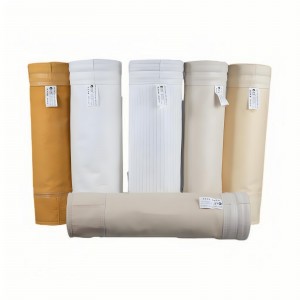
Polyester Filter Bags: The Benchmark in Industrial Filtration
In the filtration processes of industrial production and environmental protection, polyester filter bags, with their outstanding comprehensive performance, have become one of the most widely used filtration materials. As a filtration product made from polyester fibers (polyester), it not only possesses stable physical and chemical properties but also can meet the filtration requirements of various industries and media, providing a core guarantee for improving production efficiency and achieving pollutant compliance emissions.
The core advantages of polyester filter bags stem from the superior characteristics of the raw materials. Polyester fibers have high strength and excellent wear resistance, with a breaking strength of 5-7 cN/dtex, capable of withstanding the high-pressure airflow impact and dust friction in industrial filtration, and extending the service life by 30%-50% compared to ordinary filtration materials. At the same time, polyester has good thermal stability, with a continuous working temperature of up to 130°C and a momentary temperature resistance of 150°C, which can meet the temperature requirements of most industrial conditions, avoiding filter deformation or failure due to high temperatures. In terms of chemical stability, polyester has good tolerance to acids, alkalis, and organic solvents, requiring special treatment only in strongly alkaline environments, enabling it to handle complex media filtration in industries such as chemical, metallurgy, and construction.
From the structural design perspective, polyester filter bags are processed through various techniques such as needle punching, hot rolling, and coating, to meet different filtration accuracy requirements. Needle-punched polyester filter bags, with their three-dimensional structure, have a porosity of over 70%, capable of efficiently trapping dust particles, with a filtration accuracy of 1-5 μm; coated polyester filter bags have a layer of PTFE film on the base fabric, using the micro-porous structure of the film to achieve “surface filtration”, not only increasing the filtration efficiency to over 99.9%, but also effectively preventing dust from adhering to the filter, reducing the frequency of cleaning and energy consumption. Additionally, according to different application scenarios, polyester filter bags can be customized in various shapes such as circular, elliptical, and rhombic, suitable for various equipment such as pulse bag-type dust collectors and bag-type dust collectors, with convenient installation and excellent sealing performance.
In the current era of increasingly strict environmental protection trends, the environmental value of polyester filter bags is also prominent. Polyester materials can be recycled and reused, conforming to the concept of circular economy; its efficient filtration performance can effectively control the concentration of dust emissions, helping enterprises meet national environmental protection emission standards and reducing air pollution. Whether it is smoke dust removal in the thermal power industry, raw material crushing filtration in the cement industry, or tail gas purification in the chemical industry, polyester filter bags can, with stable performance, longer service life, and higher cost-effectiveness, become the ideal choice in the field of industrial filtration.
-
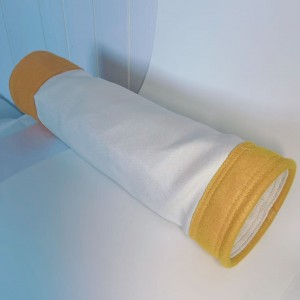
Glass Fiber Filter Bags: Technological Innovation Drives Industry Development
In this era of increasing environmental awareness, the control of dust pollution in industrial production processes has become a focus of attention for major enterprises. As an efficient dust removal device, glass fiber filter bags have unique performance advantages and occupy an important position in the field of industrial dust removal. With the continuous advancement of technology, the production technology of glass fiber filter bags is also constantly innovating, bringing new opportunities and challenges to its market development.
From a technical perspective, the production process of fiberglass filter bags has been continuously optimized. The traditional production of fiberglass filter bags mainly adopts the glass fiber needle-punched felt process. After cutting the glass fibers and conducting needle-punching to form the felt, a series of post-processing procedures are carried out to produce the filter bags. Although this process can meet basic filtration requirements, it still has certain limitations in terms of filtration accuracy, air permeability, and durability. In recent years, with the application of new materials and technologies, significant breakthroughs have been made in the production process of fiberglass filter bags. For example, using fiberglass expanded yarn as the raw material, a high-density thick-type fiberglass fabric is woven through a special weaving process. Compared with the traditional needle-punched felt, this fiberglass fabric has higher strength and better wear resistance, which can effectively extend the service life of the filter bags. At the same time, in terms of surface treatment technology, new progress has also been made. Through heat setting, pressure bonding, and treatment with waterproof agents such as PTFE (polytetrafluoroethylene) on the surface of the fiberglass fabric, a dense protective film is formed on the surface of the filter bag. This not only improves the waterproof and oil-resistant performance of the filter bag but also enhances its resistance to chemical corrosion, enabling it to better adapt to complex and variable industrial environments.
In addition to the improvement of production processes, the design of glass fiber filter bags has also been innovated. To enhance the filtration efficiency and reduce the operating resistance, some manufacturers have developed glass fiber filter bags with a gradient filtration structure. These filter bags are composed of multiple layers of glass fiber materials with different pore sizes. From the inlet to the outlet, the pore sizes gradually decrease. When the dusty gas passes through the filter bag, large particles of dust are first intercepted by the outer layer of larger pore size glass fiber materials, while small particles of dust are captured by the inner layer of smaller pore size materials. This gradient filtration structure can fully utilize the filtering advantages of different pore size glass fiber materials, achieve efficient filtration of dust of different particle sizes, reduce the accumulation of dust inside the filter bag, lower the operating resistance, and improve the cleaning effect. Moreover, some manufacturers have further enhanced the sealing performance and installation convenience of the filter bags by optimizing the sewing process and bag mouth design, thereby improving the overall performance of the products.
In terms of market application, glass fiber filter bags, due to their outstanding performance, are widely used in numerous industrial sectors. In the steel industry, during the steel smelting process, a large amount of hot and highly dusty exhaust gas is produced, which contains various metal oxides and impurities. Glass fiber filter bags can operate stably in high-temperature environments, effectively filtering the dust in this exhaust gas, ensuring compliance with emission standards, and recovering valuable metal dust to achieve resource recycling. In the cement industry, the kiln heads and kiln tails, as well as the raw material grinding and cement grinding processes, all generate a large amount of dust. Glass fiber filter bags, with their characteristics of high-temperature resistance, corrosion resistance, and high-precision filtration, have become the preferred equipment for controlling dust pollution in the cement industry, ensuring the environmental protection and sustainability of cement production. In the power industry, the flue gas produced by coal-fired boilers contains a large amount of fly ash and other particulates. Using glass fiber filter bags to filter this flue gas can significantly reduce dust emissions, reduce air pollution, and protect the normal operation of power generation equipment, thereby improving power generation efficiency. In addition, glass fiber filter bags have also been widely used in industries such as chemicals, ceramics, glass manufacturing, and waste incineration, providing effective solutions for dust pollution control in various industries.
With the increasingly strict environmental policies and the growing demand for environmental-friendly products in the market, the fiberglass filter bag market is showing a favorable development trend. On one hand, the configuration requirements for environmental protection equipment in newly-built industrial projects are constantly increasing, which prompts enterprises to increase their purchase of efficient dust removal equipment such as fiberglass filter bags. On the other hand, existing enterprises, in order to meet the increasingly strict environmental emission standards, also upgrade and replace their original dust removal equipment one after another, which brings a huge demand for renewal and upgrading in the fiberglass filter bag market. According to market research institutions’ predictions, in the coming years, the global market size of fiberglass filter bags will maintain stable growth, especially in emerging economy countries, as the industrialization process accelerates and environmental awareness improves, the prospects of the fiberglass filter bag market are broad.
However, the competition in the market has become increasingly fierce. With the growing demand for fiberglass filter bags, more and more enterprises have entered this field, making the competition even more intense. Each enterprise, in order to gain a foothold in the market, has increased investment in technological research and development, improved product quality and performance, reduced production costs, and strengthened brand building and market promotion. In this market environment, some enterprises with weaker technical capabilities and unstable product quality will face the risk of being eliminated. Therefore, for fiberglass filter bag manufacturing enterprises, how to stand out in the fierce market competition lies in continuous innovation, continuously enhancing the technical content and added value of products to meet the increasingly diverse needs of customers.
Looking ahead, with the continuous advancement of technology and the further improvement of environmental protection requirements, the fiberglass filter bag industry will embrace more development opportunities. On one hand, the continuous emergence of new technologies and materials will provide a broader space for the technological innovation of fiberglass filter bags. For instance, the application of nanotechnology and intelligent materials is expected to further enhance the performance of fiberglass filter bags, enabling new breakthroughs in aspects such as filtration accuracy, self-cleaning ability, and service life. On the other hand, as global attention to sustainable development continues to increase, green and environmentally friendly fiberglass filter bags will become the mainstream development direction in the market. Enterprises need to strengthen the research and application of environmentally friendly production processes, reduce energy consumption and pollutant emissions during the production process, and pay attention to the recyclability of products to achieve a win-win situation of economic benefits and environmental benefits.
The fiberglass filter bag, as an important equipment in the field of industrial dust removal, has a broad market prospect driven by technological innovation. However, at the same time, enterprises also need to face fierce market competition and constantly changing market demands. By continuously innovating and optimizing product performance, they can establish a foothold in the market and achieve long-term development. It is believed that with the joint efforts of all parties in the industry, the fiberglass filter bag will play a more important role in future industrial production and environmental protection. -
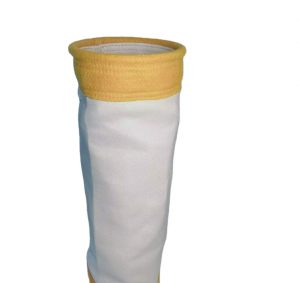
Fiberglass Filter Bags: The Backbone of Industrial Dust Removal
In the process of industrial production, dust pollution has always been a serious problem that needs to be solved urgently. It not only causes damage to the environment and affects air quality but also may pose a threat to the health of workers. To effectively address this challenge, various dust removal equipment and technologies have emerged, among which fiberglass filter bags play a pivotal role and can be called the backbone of industrial dust removal.
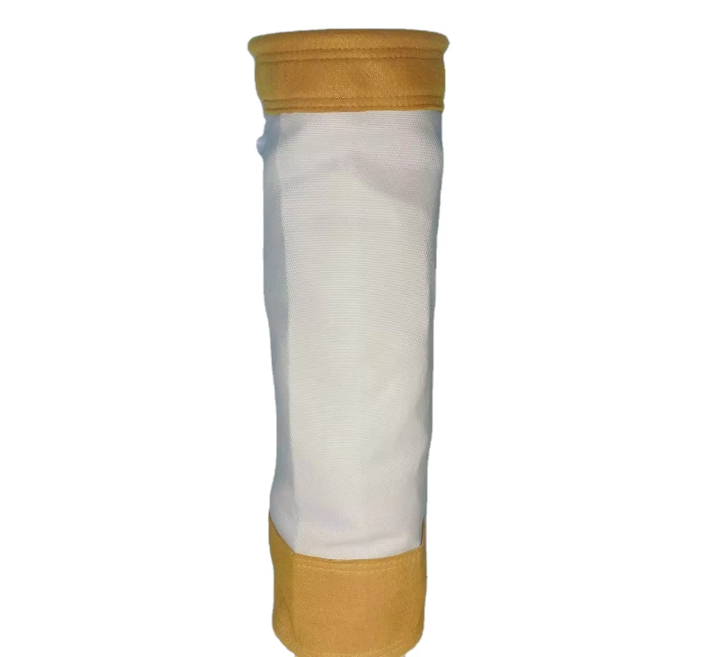 As the name suggests, fiberglass filter bags are filtering devices made mainly from glass fibers. Glass fibers have many excellent properties, laying a solid foundation for the high-performance of fiberglass filter bags. Firstly, glass fibers have excellent high-temperature resistance. In many industrial production scenarios, such as iron and steel smelting, cement manufacturing, and coal-fired power generation, a large amount of high-temperature flue gas is generated. Ordinary filtering materials may age, deform, or even lose their filtering function quickly in high-temperature environments, while fiberglass filter bags can operate stably for a long time at temperatures up to 260°C, and the instantaneous temperature resistance peak of some special models of fiberglass filter bags can even reach 300°C. This enables it to perfectly adapt to these high-temperature working conditions, ensuring efficient dust filtering under harsh temperature conditions, and guaranteeing the continuity of the production process and environmental protection requirements.Secondly, fiberglass filter bags have excellent chemical stability. Industrial waste gas has complex components and often contains various corrosive substances such as acids and alkalis. Glass fibers themselves are inert to most chemical substances and are not easy to react with these corrosive media. This characteristic allows fiberglass filter bags to maintain structural integrity and stable filtering performance when facing waste gas containing a large amount of corrosive gases generated in industries such as chemical industry and waste incineration. They will not cause filter bag damage or leakage due to chemical corrosion, thus ensuring the long-term stable operation of the dust removal system and reducing equipment maintenance costs and the frequency of filter bag replacement.Furthermore, fiberglass filter bags perform extremely well in terms of filtration precision. Their unique fiber structure forms fine filtering pores, which can effectively intercept dust particles of various particle sizes. Especially for inhalable particles that are extremely harmful to human health (such as PM10 and PM2.5), fiberglass filter bags can achieve efficient capture, stably controlling the emission concentration at an extremely low level. Some high-quality fiberglass filter bags can even reduce the emission concentration to below 10mg/m³, and in some working conditions, it can even reach 5mg/m³, fully meeting the increasingly strict environmental protection emission standards and providing a strong guarantee for enterprises to achieve green production.In addition to the above performance advantages, fiberglass filter bags also have good mechanical strength and wear resistance. In actual use, filter bags need to withstand the scouring of air flow, the friction of dust, and the mechanical force during the ash cleaning process. With its high tensile strength, fiberglass filter bags can maintain stable shape under these complex mechanical stresses, are not easy to break or damage, and thus have a long service life. This not only reduces the number of filter bag replacements, lowers the operating costs of enterprises but also improves the reliability and stability of the dust removal system, reducing the risk of production interruption caused by equipment failures.In various fields of industrial production, fiberglass filter bags play an indispensable role. In the iron and steel industry, a large amount of high-temperature flue gas containing pollutants such as metal oxides and dust is generated in various links from iron ore sintering, ironmaking to steelmaking. Fiberglass filter bags can effectively filter impurities in these flue gases in high-temperature environments, ensuring that emissions meet standards, and at the same time, recovering valuable metal dust to realize the recycling of resources. In the cement industry, the waste gas emitted from the head and tail of cement kilns has high temperature, high dust concentration, and complex components. Relying on its characteristics of high-temperature resistance, corrosion resistance, and high-precision filtration, fiberglass filter bags have become key equipment for controlling dust pollution in the cement production process, ensuring the environmental protection and sustainability of cement production. In the power industry, the flue gas generated by the combustion of coal-fired boilers contains a large amount of fly ash and other particles. Using fiberglass filter bags to filter these flue gases can significantly reduce dust emissions, reduce pollution to the atmospheric environment, and at the same time protect the normal operation of power generation equipment and improve power generation efficiency.In addition, fiberglass filter bags are also widely used in many industries such as chemical industry, ceramics, and glass manufacturing. In whatever industrial scenario, it solves the problem of dust pollution for enterprises with its excellent performance, helps enterprises realize clean production, and makes important contributions to environmental protection and sustainable development.With the increasingly strict environmental protection requirements and the continuous progress of industrial technology, fiberglass filter bags are also continuously innovating and developing. On the one hand, researchers are constantly exploring new production processes and material formulas to further improve the performance of fiberglass filter bags. For example, by improving the drawing process of glass fibers, the fibers become more uniform and delicate, thereby improving the filtration precision and air permeability of the filter bags; adopting new surface treatment technologies to enhance the waterproof and oil-proof performance of the filter bags, enabling them to better adapt to humid and oily industrial environments. On the other hand, to meet the special needs of different industries, fiberglass filter bags are also developing in the direction of diversification and personalization. For some application scenarios with special requirements for the size and shape of filter bags, manufacturers can provide customized services to produce filter bag products that meet customer needs.In conclusion, as one of the core equipment in the field of industrial dust removal, fiberglass filter bags have been widely used in many industrial industries and play an irreplaceable role with their advantages such as excellent high-temperature resistance, corrosion resistance, high-precision filtration, and good mechanical properties. With the continuous innovation and development of technology, it is believed that fiberglass filter bags will continue to play an important role in industrial production and environmental protection in the future, contributing more to the realization of green and sustainable development goals.
As the name suggests, fiberglass filter bags are filtering devices made mainly from glass fibers. Glass fibers have many excellent properties, laying a solid foundation for the high-performance of fiberglass filter bags. Firstly, glass fibers have excellent high-temperature resistance. In many industrial production scenarios, such as iron and steel smelting, cement manufacturing, and coal-fired power generation, a large amount of high-temperature flue gas is generated. Ordinary filtering materials may age, deform, or even lose their filtering function quickly in high-temperature environments, while fiberglass filter bags can operate stably for a long time at temperatures up to 260°C, and the instantaneous temperature resistance peak of some special models of fiberglass filter bags can even reach 300°C. This enables it to perfectly adapt to these high-temperature working conditions, ensuring efficient dust filtering under harsh temperature conditions, and guaranteeing the continuity of the production process and environmental protection requirements.Secondly, fiberglass filter bags have excellent chemical stability. Industrial waste gas has complex components and often contains various corrosive substances such as acids and alkalis. Glass fibers themselves are inert to most chemical substances and are not easy to react with these corrosive media. This characteristic allows fiberglass filter bags to maintain structural integrity and stable filtering performance when facing waste gas containing a large amount of corrosive gases generated in industries such as chemical industry and waste incineration. They will not cause filter bag damage or leakage due to chemical corrosion, thus ensuring the long-term stable operation of the dust removal system and reducing equipment maintenance costs and the frequency of filter bag replacement.Furthermore, fiberglass filter bags perform extremely well in terms of filtration precision. Their unique fiber structure forms fine filtering pores, which can effectively intercept dust particles of various particle sizes. Especially for inhalable particles that are extremely harmful to human health (such as PM10 and PM2.5), fiberglass filter bags can achieve efficient capture, stably controlling the emission concentration at an extremely low level. Some high-quality fiberglass filter bags can even reduce the emission concentration to below 10mg/m³, and in some working conditions, it can even reach 5mg/m³, fully meeting the increasingly strict environmental protection emission standards and providing a strong guarantee for enterprises to achieve green production.In addition to the above performance advantages, fiberglass filter bags also have good mechanical strength and wear resistance. In actual use, filter bags need to withstand the scouring of air flow, the friction of dust, and the mechanical force during the ash cleaning process. With its high tensile strength, fiberglass filter bags can maintain stable shape under these complex mechanical stresses, are not easy to break or damage, and thus have a long service life. This not only reduces the number of filter bag replacements, lowers the operating costs of enterprises but also improves the reliability and stability of the dust removal system, reducing the risk of production interruption caused by equipment failures.In various fields of industrial production, fiberglass filter bags play an indispensable role. In the iron and steel industry, a large amount of high-temperature flue gas containing pollutants such as metal oxides and dust is generated in various links from iron ore sintering, ironmaking to steelmaking. Fiberglass filter bags can effectively filter impurities in these flue gases in high-temperature environments, ensuring that emissions meet standards, and at the same time, recovering valuable metal dust to realize the recycling of resources. In the cement industry, the waste gas emitted from the head and tail of cement kilns has high temperature, high dust concentration, and complex components. Relying on its characteristics of high-temperature resistance, corrosion resistance, and high-precision filtration, fiberglass filter bags have become key equipment for controlling dust pollution in the cement production process, ensuring the environmental protection and sustainability of cement production. In the power industry, the flue gas generated by the combustion of coal-fired boilers contains a large amount of fly ash and other particles. Using fiberglass filter bags to filter these flue gases can significantly reduce dust emissions, reduce pollution to the atmospheric environment, and at the same time protect the normal operation of power generation equipment and improve power generation efficiency.In addition, fiberglass filter bags are also widely used in many industries such as chemical industry, ceramics, and glass manufacturing. In whatever industrial scenario, it solves the problem of dust pollution for enterprises with its excellent performance, helps enterprises realize clean production, and makes important contributions to environmental protection and sustainable development.With the increasingly strict environmental protection requirements and the continuous progress of industrial technology, fiberglass filter bags are also continuously innovating and developing. On the one hand, researchers are constantly exploring new production processes and material formulas to further improve the performance of fiberglass filter bags. For example, by improving the drawing process of glass fibers, the fibers become more uniform and delicate, thereby improving the filtration precision and air permeability of the filter bags; adopting new surface treatment technologies to enhance the waterproof and oil-proof performance of the filter bags, enabling them to better adapt to humid and oily industrial environments. On the other hand, to meet the special needs of different industries, fiberglass filter bags are also developing in the direction of diversification and personalization. For some application scenarios with special requirements for the size and shape of filter bags, manufacturers can provide customized services to produce filter bag products that meet customer needs.In conclusion, as one of the core equipment in the field of industrial dust removal, fiberglass filter bags have been widely used in many industrial industries and play an irreplaceable role with their advantages such as excellent high-temperature resistance, corrosion resistance, high-precision filtration, and good mechanical properties. With the continuous innovation and development of technology, it is believed that fiberglass filter bags will continue to play an important role in industrial production and environmental protection in the future, contributing more to the realization of green and sustainable development goals. -

Glass fiber filter bag: Multi-layer composite structure helps achieve efficient filtration
Modern medium-efficiency bag filters made of glass fiber usually adopt a carefully designed multi-layer composite structure. Each layer of material plays a unique role, jointly ensuring efficient filtration and long-term use.
(1) Base layer: The core of filtration
The base layer is made of non-woven fabric formed by needle-punching fine-diameter glass fibers. It is the main part of the filtration. The fineness, porosity and thickness of the fibers in this layer have a direct impact on the filtration accuracy and dust holding capacity. The thickness of high-quality glass fiber needle-punched felt is generally controlled at 1.8 – 2.5mm, and the air permeability is between 80 – 120L/m²·s. Fine-diameter glass fibers formed by needle-punching form a three-dimensional network structure, which can effectively intercept most particulate matter. The finer fiber diameter helps to improve the capture efficiency of fine particulate matter, but it will correspondingly increase the initial resistance. Therefore, in practical applications, the fiber diameter and other parameters need to be optimized according to the dust characteristics and system air volume to achieve the best filtration effect.
(2) Reinforcement layer: Enhancing strength and stability
The reinforcement layer usually uses high-strength glass fiber mesh fabric or polyester base fabric, with a weight of 80 – 120g/m². It is usually placed between or on one side of the base layer. The existence of this layer significantly enhances the tensile strength and dimensional stability of the filter material. Relevant test data show that adding the reinforcement layer can increase the breaking strength of the filter material by 50% – 80%. In industrial dust removal systems, pulse cleaning is a common cleaning method, and the filter bags need to withstand the mechanical stress of the pulse airflow. The addition of the reinforcement layer enables the filter bags to better resist such mechanical stress, effectively preventing the bags from cracking, deforming, etc. during cleaning, and prolonging the service life of the filter bags, ensuring the normal operation of the dust removal system.
(3) Surface treatment layer: Improving surface properties
The surface treatment layer applies chemical agents such as PTFE or silicone oil by immersion or spraying to improve the surface properties of the filter material. The common addition amount of the treatment agent is 5% – 15% of the filter material weight. After treatment, the water repellency angle of the filter material can reach above 130°, and the dust shedding rate increases by 30% – 50%. Glass fibers have the disadvantages of high brittleness and poor bending resistance. The surface treatment technology effectively solves these problems. For example, PTFE immersion treatment can make the polytetrafluoroethylene emulsion penetrate the surface of the fibers, forming a micrometer-level coating, which not only significantly improves the flexibility and chemical stability of the filter material, but also raises the usage temperature of the filter material to 280℃, while reducing the surface energy and making the dust accumulation easier to remove; silicone oil treatment can also improve the surface properties of the filter material to some extent, enhancing its anti-fouling ability.
-

Glass fiber filter bags: The backbone of industrial dust removal
Among the numerous stages in industrial production, dust pollution has always been a pressing issue that needs to be addressed urgently. From the kilns in cement manufacturing to the blast furnaces in steel smelting, a large amount of dust is discharged along with the exhaust gas, causing severe pollution to the environment and posing a threat to the health of workers. In this battle against dust, fiberglass filter bags, with their outstanding performance, have become a pillar in the field of industrial dust removal.
Foundation laid by superior performance
The main material of fiberglass filter bags is glass fiber, which endows the filter bags with many excellent characteristics.(1) Outstanding high-temperature resistance
The softening point of glass fiber is as high as 550℃, and its strength retention rate exceeds 90% even when used for a long time at 260℃. Through thermogravimetric analysis (TGA), it can be seen that glass fiber shows no significant quality loss before 500℃, while polyester fiber begins to decompose at around 250℃. This characteristic enables fiberglass filter bags to easily handle high-temperature smoke gas of up to 260℃ in industries such as steel and cement, operating stably in high-temperature environments and continuously exerting filtering effects without deformation or damage due to excessive temperature, thus ensuring the continuity of industrial production.
(2) Strong chemical inertness, corrosion resistance
Glass fiber is resistant to acid and alkali corrosion within the pH range of 2 – 11. It maintains good stability in acidic gas environments such as SOx and NOx. Relevant experiments show that after exposing the fiberglass filter material to 50% sulfuric acid mist for 48 hours, its strength retention rate remains above 85%, while polypropylene fiber has completely degraded at this time. This strong corrosion resistance makes fiberglass filter bags an ideal choice for industries with corrosive environments such as chemical and metallurgical industries. Even in harsh working conditions filled with various corrosive gases and chemicals, they can operate stably for a long time, effectively filtering dust, extending their service life, and reducing the cost of replacing filter bags for enterprises.
(3) Excellent electrical performance, anti-static
The volume resistivity of glass fiber is between 10¹² – 10¹⁴Ω·cm, effectively preventing static electricity accumulation. In industrial production, many dusts such as coal dust and aluminum powder are flammable and explosive. If the filter bag cannot effectively prevent static electricity, the resulting static sparks are likely to trigger explosion accidents. In contrast, the volume resistivity of polyester fiber is approximately 10⁹Ω·cm, more prone to generating static electricity. The anti-static characteristic of fiberglass filter bags provides safety guarantees for industrial production in flammable and explosive dust environments, significantly reducing safety risks.
(4) Deep filtration, high dust retention capacity
Fiberglass filter bags mainly rely on mechanical interception and diffusion deposition effects of the fiber mesh for deep filtration. Unlike coated filter materials that mainly perform surface filtration, fiberglass needle-punched felt has a higher dust retention capacity and a gentler resistance growth curve. In actual industrial applications, dust concentrations often fluctuate, and fiberglass filter bags can maintain stable filtering performance under fluctuating dust concentrations in such conditions, without a significant drop in filtration efficiency or a sharp increase in resistance due to short-term increases in dust volume, ensuring the stable operation of the dust removal system.
-
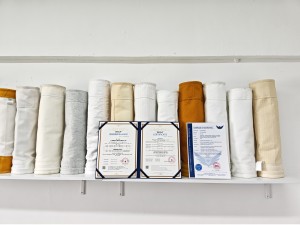
Working Principle of Anti-static Dust Filter Bags
In order to effectively solve the problem of static electricity, anti-static dust filter bags adopt special designs and materials. Their main working principle is to form a conductive network by mixing conductive fibers, such as stainless steel fibers, carbon fibers, or conductive polymer fibers, into the filter material. When static electricity is generated during the dust filtration process of the filter bag, these conductive fibers can quickly conduct away the static charge, preventing the static electricity from accumulating on the surface of the filter bag. At the same time, some anti-static dust filter bags also undergo anti-static treatment on the surface of the filter material, such as using anti-static coatings, to further reduce the surface resistance of the filter bag and enhance its static conductivity. This two-pronged approach enables anti-static dust filter bags to continuously and stably play an anti-static role in complex industrial environments, providing a strong guarantee for the safe operation of dust removal systems.Wide Range of Application IndustriesAnti-static dust filter bags are widely used in many industries.- Chemical Industry: The chemical production process involves a large number of flammable and explosive chemicals and dust, such as organic dust generated in organic synthesis workshops and light oil mist in petrochemical plants. Once these substances encounter electric sparks, they are extremely likely to cause explosions and fires. Anti-static dust filter bags can effectively filter dust and eliminate static electricity hazards in all aspects of chemical production, such as tail gas treatment of reaction kettles and workshop ventilation and dust removal, ensuring the safe and stable operation of chemical production.
- Coal Industry: A large amount of coal dust is generated during coal mining, processing, and transportation. Coal dust is not only flammable but also has a higher explosion risk in relatively closed environments such as underground mines. Anti-static dust filter bags are widely used in the ventilation systems of coal mines and the dust removal equipment of coal preparation plants, etc., which can timely filter coal dust, prevent coal dust explosions caused by static electricity, and protect the lives of coal mine workers and the smooth progress of coal mine production.
- Metal Processing Industry: During the production, processing, and storage of metal powders such as aluminum powder and magnesium powder, the friction between metal powders and equipment, pipelines, etc. is extremely likely to generate static electricity. These metal powders are highly flammable and explosive, and once an explosion occurs, the consequences are unthinkable. Anti-static dust filter bags play a key role in the workshop dust removal systems and dust collection equipment of the metal processing industry, being able to quickly conduct away static electricity and efficiently filter metal dust, building a solid defense line for the safety production of the metal processing industry.
- Grain Processing Industry: A large amount of dust is generated during the storage, transportation, and grinding of grains, such as flour, starch, and grain dust. These dusts have a high explosion risk when mixed with air in a closed environment. Take flour mills as an example. During the operation of equipment such as flour mills and dust collectors, the friction between dust and equipment components is likely to generate static electricity. Anti-static dust filter bags can effectively eliminate static electricity hazards, ensure the safe production of grain processing enterprises, and prevent dust explosion accidents.
Outstanding Performance Advantages- Excellent Safety Performance: The most core advantage of anti-static dust filter bags lies in their excellent anti-static performance, which can effectively reduce the risk of dust explosions and create a safe production environment for enterprises. By conducting away static electricity in a timely manner, it avoids fire and explosion accidents caused by static electricity, protecting the lives of employees and the property safety of enterprises.
- High Filtration Efficiency: In addition to the anti-static function, anti-static dust filter bags also perform well in terms of filtration efficiency. They can efficiently intercept various fine dust particles and also have a good filtering effect on smaller dust particles, ensuring that the discharged gas meets environmental protection standards and reducing dust pollution to the environment.
- Long Service Life: Due to the use of special materials and processes, anti-static dust filter bags have good wear resistance and corrosion resistance. Under normal use, their service life is longer than that of ordinary filter bags, reducing the frequency of filter bag replacement, lowering the maintenance costs and downtime of enterprises, and improving production efficiency.
- Strong Adaptability: Anti-static dust filter bags can adapt to various complex industrial environments. Whether it is a high-temperature, high-humidity environment or an environment containing corrosive gases, they can operate stably and maintain good anti-static and filtering performance. For example, in the high-temperature tail gas treatment of reaction kettles in some chemical enterprises, anti-static dust filter bags can effectively filter dust and eliminate static electricity in a high-temperature environment.
As an important device in the field of industrial dust removal, anti-static dust filter bags are of great significance for ensuring production safety and reducing environmental pollution. With the continuous development of industrial technology and the increasing requirements for environmental protection, the application prospects of anti-static dust filter bags will be even broader. Enterprises should fully recognize the importance of anti-static dust filter bags, and reasonably select and use anti-static dust filter bags according to their own production processes and dust characteristics, laying a solid foundation for the sustainable development of enterprises. -
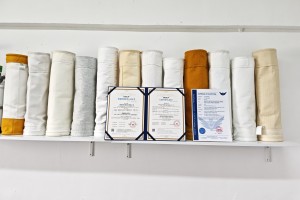
Anti-static Dust Filter Bags: A Safety Barrier for Industrial Dust Removal
During the industrial production process, dust pollution is a problem that cannot be ignored. It not only causes serious damage to the environment but may also endanger the health of workers. More seriously, in some specific industries, such as chemical engineering, coal mining, and metal processing, if dust mixes with air to a certain concentration and encounters a fire source or electrostatic discharge, it is extremely likely to trigger an explosion accident, causing irreparable losses. Therefore, efficient dust removal equipment and technologies are crucial for industrial safety production. As a key dust removal component, anti-static dust filter bags play an irreplaceable role in preventing dust explosions and ensuring production safety.
Hazards Caused by Static ElectricityIn industrial dust removal systems, factors such as the friction between dust and filter bags and the high-speed flow of air can easily generate static electricity in the filter bags. For ordinary filter bags, once static electricity is generated, it is difficult to dissipate in a timely manner and will gradually accumulate on the surface of the filter bags. When the static electricity accumulates to a certain extent, electrostatic discharge may occur, generating electric sparks. In an environment with flammable and explosive dust, these electric sparks are like a bomb that may explode at any time, highly likely to trigger a dust explosion, bringing huge casualties and property losses to enterprises. For example, in flour mills, flour dust particles are small and flammable, and a large amount of dust is generated during the production process, such as in the grinding and conveying processes. If the filter bags in the dust removal system do not have anti-static functions, dust explosion accidents caused by static electricity may occur at any time. According to relevant statistical data, in some past dust explosion accident cases, the proportion of accidents caused by static electricity is quite high, which fully highlights the importance of anti-static dust filter bags in industrial production.Working Principle of Anti-static Dust Filter BagsIn order to effectively solve the problem of static electricity, anti-static dust filter bags adopt special designs and materials. Their main working principle is to form a conductive network by mixing conductive fibers, such as stainless steel fibers, carbon fibers, or conductive polymer fibers, into the filter material. When static electricity is generated during the dust filtration process of the filter bag, these conductive fibers can quickly conduct away the static charge, preventing the static electricity from accumulating on the surface of the filter bag. At the same time, some anti-static dust filter bags also undergo anti-static treatment on the surface of the filter material, such as using anti-static coatings, to further reduce the surface resistance of the filter bag and enhance its static conductivity. This two-pronged approach enables anti-static dust filter bags to continuously and stably play an anti-static role in complex industrial environments, providing a strong guarantee for the safe operation of dust removal systems. -
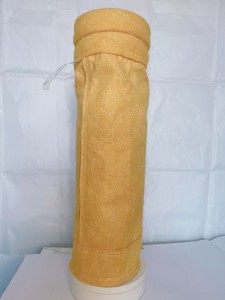
P84 Dust Filter Bag: The “Precision Guardian” for High – end and Complex Dust Removal
In high – end and complex industrial dust removal scenarios, the P84 (polyimide) dust filter bag, with its excellent high – temperature resistance and efficient filtration performance, becomes a “precision guardian” for accurately collecting fine dust and coping with harsh environments.1. Unique Material Attributes
P84 fiber is a polyimide fiber with an irregular cross – section. It has a high melting point, with a long – term continuous service temperature reaching 260°C, and can momentarily withstand up to 300°C. It has significant advantages in flue gas dust removal in high – temperature industries such as hot blast stoves in steel mills and glass kilns.It has excellent chemical stability, showing good tolerance to various strong acids, strong alkalis, and organic solvents. Even in complex chemical environments (such as dust removal of multi – component waste gas in the chemical industry), it can maintain the stable structure of fibers and is not easily damaged by erosion.2. Filtration and Collection Efficiency
Due to the irregular cross – section of the fiber, the P84 filter bag has a large specific surface area and strong dust interception ability. For PM2.5 and finer dust, it can efficiently collect them through the complex pores between fibers. In industries with extremely high requirements for exhaust gas cleanliness such as electronics and pharmaceuticals, it can ensure extremely low particulate matter concentration in the exhaust gas, meeting strict environmental protection and production standards.In terms of dust cleaning, although P84 fiber is relatively brittle, by reasonably designing the filter bag structure (such as optimizing the needling density and selecting a suitable base cloth) and cooperating with dust cleaning methods such as pulse jet, it can ensure the dust cleaning effect while reducing fiber damage, maintaining the long – term efficient operation of the filter bag.3. Application Scenarios and Value Embodiment
It is widely used in precision dust removal in high – end manufacturing, chemical, metallurgical and other industries. For example, in the waste gas treatment of electronic chip manufacturing workshops, P84 filter bags collect fine dust to avoid affecting chip quality -
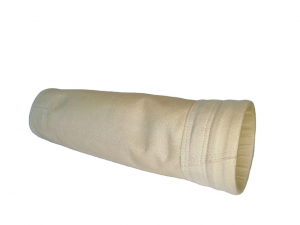
PPS Dust Filter Bag: The “Challenger” in High – Temperature and Harsh Working Conditions
When industrial dust removal faces harsh working conditions such as high temperature and high corrosion, the PPS (polyphenylene sulfide) dust filter bag, with its unique performance, becomes a key solution, safeguarding clean production in complex environments.1. Hardcore Material Performance
The melting point of PPS fiber is about 285°C, with a continuous service temperature reaching 190°C, and it can momentarily withstand 220°C. It can calmly cope with high – temperature flue gas in industries such as coking, waste incineration, and thermal power generation.Its chemical corrosion resistance is excellent, showing strong tolerance to acids, alkalis, organic solvents, etc. Especially in environments with sulfur – containing flue gas (such as flue gas in coal – fired power plants and coking plants) and chlorine – containing waste gas (in waste incineration plants), it is not prone to fiber degradation and embrittlement, ensuring the stable structure and filtration performance of the filter bag.2. Filtration Advantages and Challenge Response
The PPS filter bag itself has a certain flame retardancy. In working conditions with open flames or high – temperature sparks (such as dust removal in waste incinerators), it can reduce the risk of fire and improve system safety.For high – humidity and high – viscosity dust, the combination of the smooth surface and chemical stability of PPS can reduce dust adhesion. For example, in dust removal of flue gas after wet desulfurization, it can effectively collect fine dust, and the dust cleaning is relatively smooth, maintaining a low operating resistance and ensuring dust removal efficiency. However, PPS will slowly undergo oxidative aging in a long – term high – temperature and oxygen – containing environment. Measures such as optimizing the oxygen content in flue gas and selecting PPS fibers with anti – oxidation treatment need to be taken to alleviate this.3. Typical Applications and Values
In waste – to – energy power plants, PPS filter bags are used to treat complex flue gas generated by incineration, withstanding high temperature, corrosion, and dust impact, ensuring the compliance emission of exhaust gas; in the coke oven flue gas treatment of coking plants, they collect coke powder, sulfide and other pollutants, helping environmental protection and production coordination. After a coking plant adopted PPS filter bags, the particulate matter emission concentration in flue gas decreased from exceeding the standard to below 10mg/m³, and the service life of the filter bags exceeded 2 years. It not only solved the environmental protection problems but also reduced the equipment operation and maintenance costs, highlighting its irreplaceability in harsh working conditions. -
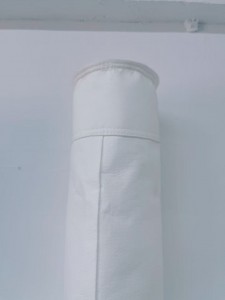
Polyester Dust Filter Bag: The “Basic Backbone” of Industrial Dust Removal
In the field of industrial dust removal, polyester dust filter bags are widely used basic products. Thanks to numerous practical features, they become the first choice for many conventional working conditions.1. Material Properties and Advantages
Polyester, scientifically known as polyester fiber, boasts good chemical stability. It has a relatively moderate temperature resistance, with a normal continuous service temperature around 130°C, and can momentarily withstand 150°C. This makes it suitable for conventional temperature environments in most industrial productions, such as dust control in general building materials and mechanical processing industries.Its wear resistance is outstanding. In working conditions where dust frequently scours and filter bags continuously rub against cages, it guarantees a service life. Moreover, polyester fiber has decent chemical corrosion resistance, tolerating common weak acid – base gases (like acidic and alkaline pollutants in ordinary industrial waste gas) to a certain extent, and is not prone to rapid damage due to chemical erosion.2. Filtration and Dust – Cleaning Performance
The fiber structure of polyester dust filter bags is reasonable, with evenly distributed pores, enabling efficient dust interception. For fine dust particles, it can achieve good collection through a combination of surface filtration and deep – layer filtration, ensuring exhaust gas meets standards.During dust cleaning, whether it is mechanical vibration dust cleaning, pulse jet dust cleaning, or reverse air dust cleaning, the polyester material shows good adaptability. It has excellent elastic recovery ability; after dust cleaning, the filter bag can quickly return to its initial filtration state, maintaining stable filtration resistance and ensuring the long – term efficient operation of the dust removal system.3. Applicable Scenarios and Cases
It is widely used in raw material crushing and conveying links in cement plants, steel mills, as well as dust collection in furniture factories, grain processing plants, etc. Take a cement plant as an example. By using polyester filter bags in the raw material mill system, it effectively collects raw material powder, the system operates stably, and the service life of the filter bags reaches 1 – 2 years. This ensures compliance with production environment and emission regulations, and the cost control is also relatively ideal, demonstrating the reliable value of polyester bags in conventional industrial dust removal. -
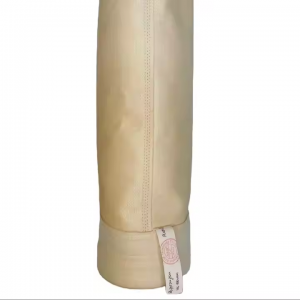
Application Fields of PPS Dust Filter Bags
Application Fields of PPS Dust Filter BagsDue to the excellent performance characteristics of PPS dust filter bags, they are widely used in many industries, playing a crucial role.Power Industry
- Coal-Fired Power Plants: The flue gas generated during coal combustion usually has a temperature range of 140 – 180°C and contains a large amount of acidic gases such as SO₂ and NOx, as well as dust. PPS dust filter bags can operate stably in such high-temperature and highly corrosive environments, effectively filtering dust and resisting the erosion of acidic gases. According to statistics, after a large coal-fired power plant adopted PPS filter bags, the dust emission concentration decreased from 50mg/m³ to below 10mg/m³, significantly improving environmental benefits, ensuring that the flue gas meets the emission standards, and meeting the increasingly stringent environmental protection requirements.
- Waste Incineration Power Generation: The flue gas generated by waste incineration has a complex composition, containing not only highly corrosive gases such as HCl and SO₂ but also pollutants like dioxins and heavy metals, with a large temperature fluctuation range (120 – 200°C). PPS filter bags, with their high-temperature resistance and chemical corrosion resistance, can efficiently intercept dust and pollutants while withstanding frequent temperature changes, ensuring the stable operation and environmental compliance of the waste incineration power generation system, and providing strong support for the sustainable development of the waste incineration power generation industry.
Steel Industry
In the steel production process, such as in blast furnace ironmaking, converter steelmaking, and other processes, a large amount of high-temperature dust and waste gas are generated. These waste gases contain a large number of dust particles and harmful gases such as CO and SO₂. PPS dust filter bags can efficiently remove dust particles in an environment with high temperature, high dust concentration, and corrosive gases, reduce the flue dust emission concentration, and minimize air pollution. At the same time, they protect production equipment, extend its service life, and improve production efficiency.Chemical Smelting Industry
In chemical production processes such as smelting, petrochemicals, and coking, the flue gas often contains high concentrations of acidic gases (such as sulfuric acid mist, hydrochloric acid gas), organic pollutants, and high-temperature dust. For example, in metallurgical processes such as copper and zinc smelting, PPS dust filter bags can effectively filter dust containing heavy metals and resist the corrosion of sulfides in the flue gas. In chemical production, many reaction processes generate corrosive waste gases. The chemical corrosion resistance of PPS filter bags enables them to adapt to these harsh working conditions, operate stably, and achieve efficient dust removal, providing reliable guarantee for environmentally friendly production in the chemical smelting industry.Building Materials and Cement Industry
The flue gas emitted from the kiln head and kiln tail of cement plants has a high temperature (150 – 200°C) and contains alkaline dust and a small amount of acidic gases. PPS filter bags can adapt to high-temperature environments and resist the abrasion of alkaline dust and the corrosion of acidic gases. In the cement production process, stable ventilation and efficient dust removal are crucial for ensuring product quality and production efficiency. PPS dust filter bags can efficiently filter dust, maintain stable ventilation during cement production, improve production efficiency, and meet environmental protection requirements, helping the building materials and cement industry achieve green production.Other Industries
In addition to the above main industries, PPS dust filter bags are also widely used in industries such as glass manufacturing, ceramic production, and biomass power generation. In the glass manufacturing process, the flue gas generated by high-temperature furnaces contains dust and some volatile substances, and PPS filter bags can effectively purify the flue gas. In the ceramic industry, a large amount of flue gas and dust generated during the firing process can also be treated by PPS dust filter bags. In biomass power generation, the flue gas contains many fine particles and some corrosive components. PPS filter bags can effectively remove particles and resist a certain degree of corrosion, ensuring the environmental protection of the biomass power generation process.